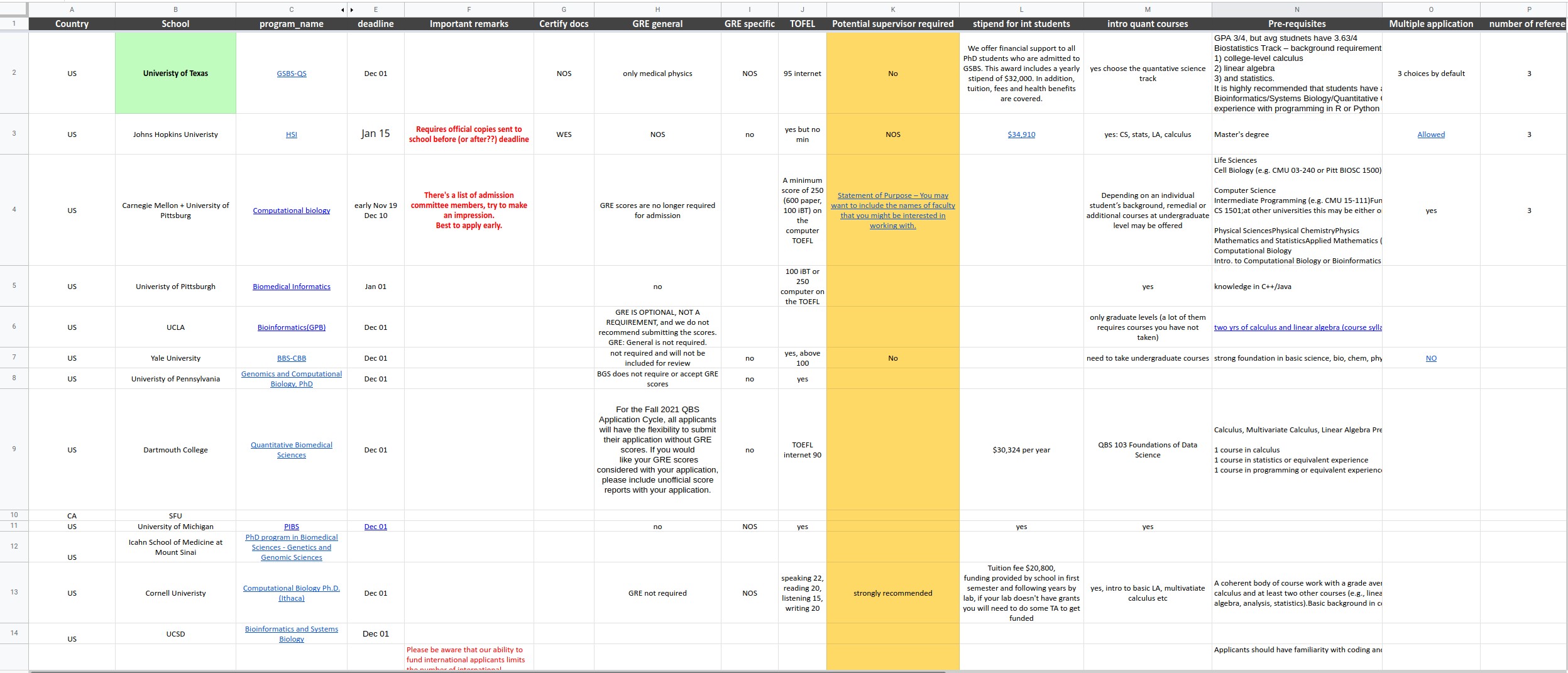This is my second year applying to (computational biology/bioinformatics) Ph.D. programs, and I wish to summarize things I have learned in this post so that I can share it with fellow young scientists.
Career Goals
I knew I wanted to spend my career doing research after spending most of my undergraduate summers in labs, and this thought is consolidated after I have been doing full-time research for my MPhil degree. Specifically, I feel a strong drive to do research that pushes the translational science boundary, I want to see my work ended up offering new understanding about malignancy mechanisms, maximizing the efficiency of existing treatment options, and perhaps suggest new therapeutic directions. There are many disciplines that could achieve this greater purpose, but I chose to do computational work because (1) I think much of the current treatment efficiency gap can be addressed by perfecting information (e.g. obtaining heterogeneous treatment effect profiles of different drugs, routinely sequencing tumors, processing and synthesizing new insights from omics), and (2) writing scripts and modeling data is a lot of fun.
Even though I know I can work towards the direction of this goal by getting a job in an informatics company, I think getting a Ph.D. is the wisest choice at this moment such that I have the freedom to start my own lab or work as a senior scientist in the industry. Regardless of where I would end up choosing, a Ph.D. is without doubt a pre-requisite in all these options.
Academic background
I have a BSc in Biomedical Sciences, and I am about to finish my MPhil this summer. I didn’t really care that much about my exams when I was in undergraduate, so my grades were OK, but they were not stellar. (Just like Buffett😉) I have accumulated several publications throughout the years, most of which I attribute to luck (opportunity + preparation), and I think it’s really the main thing that get admission committees to look at my application at all. Another thing is that my TOEFL was pretty good (R30, L30, W23, S29), so the schools know that I wouldn’t have a problem communicating my ideas as a Ph.D. student. (One prof who interviewed me specifically praised my communication skills, and that made me really happy😄). I didn’t do GRE because I didn’t have enough time and I thought it was a lot of work with relatively few returns.
20 Things I wish I knew before I start my application
- Search extensively for related keywords not just by title of the Ph.D. programs
- you’d be surprised by how different institutions name their programs differently!!
Start looking at details of available programs early and create an spreadsheet about different programs and labs
![spreadsheet]()
- Look into whether you need WES verification
- I didn’t apply to Cornell, UCSF because of this, and I didn’t have the option to go to MSKCC
- You don’t necessarily need to talk to PIs, but look at their research early, and ideally identify a couple of potential PIs before applying there.
- Go to ALL their admission talks!! -> meaning mark your calendar early
- Look out for mentoring schemes
- Yale’s BME program has it, and it’s a chance for you to get insider’s information
- Connect with existing students, and ideally students currently working or worked in your lab of interest
- Scan and request all your documents well ahead of time
- Prepare your CV and publication list early
- Ask for reference letters early and always prepare a draft early
- Get TOEFL and GRE out of the way ASAP even if your school doesn’t require them
- Save money for application fees
- Prepare a different folder on your drive/PC for each school, as they require slightly different things on the supporting documents
- John Hopkins’s supporting doc system takes a while to update status as received (idk why!!) so don’t panic and, don’t submit too close to deadline!!!!
- Application fees are expensive AF
- Get an account on the application portals and go through everything right away, because some of the info (e.g. fee, WES requirements) are only available on there
- Some universities like Yale requires that you have taken TOEFL before November
- DON’T PULL ALL NIGHTERS TO SUBMIT YOUR APPLICATIONS, YOU WILL MAKE THE STUPIDEST TYPOS
- Absolutely avoid the “i’ve always wanted to…” in your statements or introduction, this is a kiss of death, or things like “my goal is to help people”
- (IMPORTANT FOR INTERNATIONAL STUDNETS) You need to check whether international students are eligible for the school’s funding
- This is perhaps the most important tip I would give, funding is SUPER DUPER important and will affect the quality of your life massively for the duration of your PhD.
- Aim for schools that offer a funding scheme that allows you to rotate. My first year applying to Ph.D. programs was mostly for Canadian universities, but the notion of signing up the next 5 years of my life in a place I’ve never been to and people I have never met sounded too risky. This type of recruitment is also risky for PIs because they will need to assess the ability of a candidate without actually working with them. This can be alleviated by working as an RA or Master’s degree intern, but these steps obviously significantly lengthens your preparation time. That’s why I didn’t apply to any Canadian labs this round.
- Some PhD programs rely on NIH training grant, which is NOT available for international students!! So your chances of getting accepted into these schools are EXTREMELY LOW, unless you’ve got a first author paper in Cell & Science and your own fellowship that you’ve secured elsewhere
- Also, school based funding is always superior to PI provided project-specific grant funding
Interview Tips
Common Interview questions
- where do you see yourself in the next 5 years
- why do you choose us? why are we better than other schools?
- you shouldn’t expect you can talk about your work with slides, but do prepare for a short (5mins) talk that summarizes your work
- Which courses do you want to take
Preparing for the interviews
- Read your potential PI’s review, opinion or commentary styled-papers. Pay extra attention to sections about ‘future outlooks’ or ‘challenges’, these are likely what your future research will be about, and make sure those are what you are wiling to spend the next 5 year of your life working on.
- mention relocation or change of fields/interests lately
- why do you choose this lab? (Emphasize on matching research interests)
Post interview thoughts
- they probably don’t quiz on your hard knowledge that much
- SHOW PASSION ABOUT YOUR RESEARCH, REALLY IMPORTANT
- don’t fake it, they’ll know it
- also a test of how you can summarize your research within a couple of minutes -> communication skills (no joke i saw someone who could barely talk in english during the informal intro/chat i wonder how they did)
- find something or identify someone who share something in common with you, e.g. Your potential PI studied or lived in Hong Kong, and I’m from HK
Final Thoughts
Getting a Ph.D. degree in the field you love is a very challenging experience, and you do not want to embark on this journey if you are not 100% sure if this is what you want and need in your career. It is worth the time to go through extensive preparation, and your future self will thank you for being diligent in this matter. I hope you will get the Ph.D. offer you’ve always want and work with a mentor who will guide you to achieve your fullest potential!

